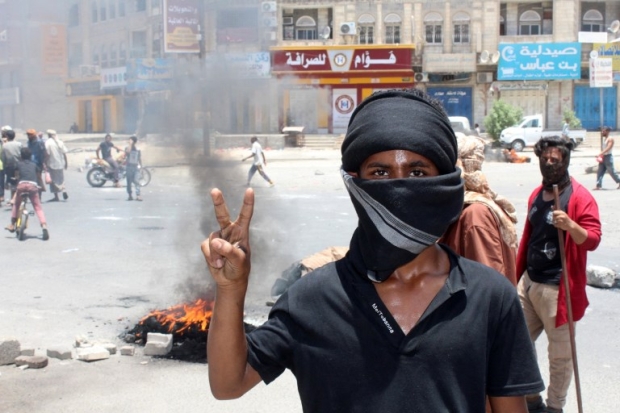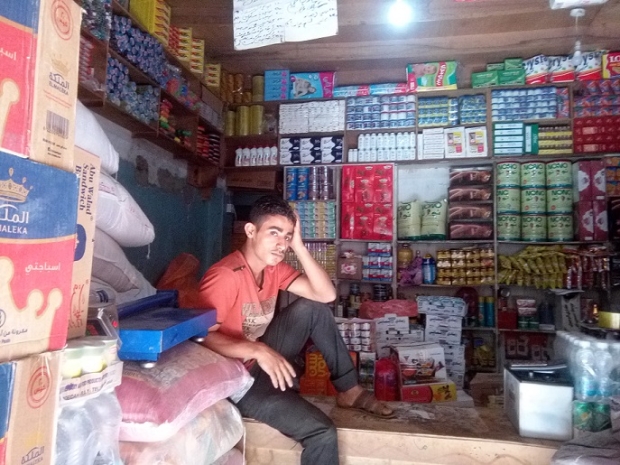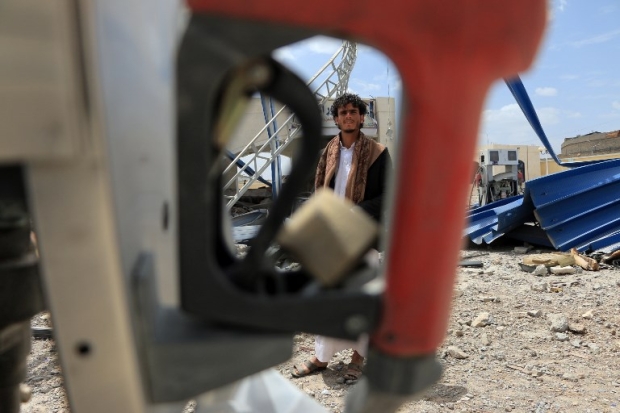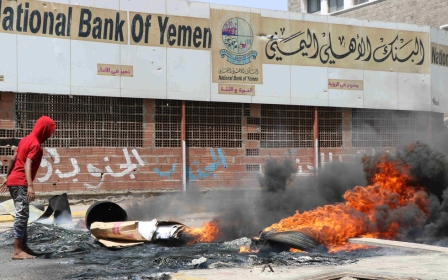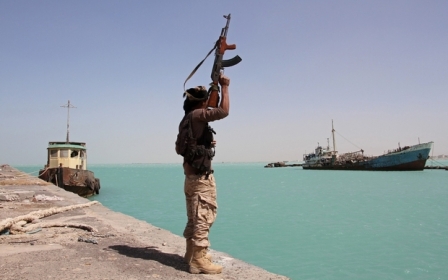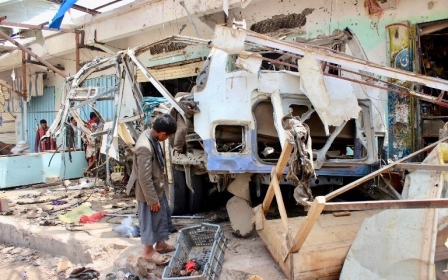Currency crisis: Yemenis live off leftovers as they wait for prices to drop
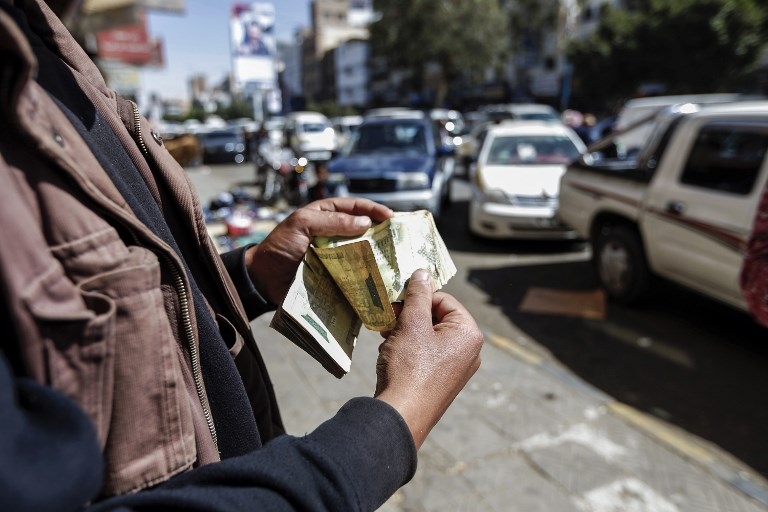
TAIZ, Yemen - Mohammed Saeed, a builder in his late 40s, typically visits the al-Awadhi street market every day to buy basic goods for the six members of his family.
But last Saturday, he discovered that prices at his regular spot had more than doubled. The money in his pocket wouldn’t stretch to cover what they needed.
This new collapse may lead them to starve to death, so we appeal the international community to pressure on warring sides to stop the war
- Ahmed Saeed Shamakh, economist
So he returned home without anything, hoping the price spike was an aberration.
"The next day, I returned to the market and I found some traders had closed their stores and others were selling commodities with more expensive prices,” he told Middle East Eye. “When I asked about the reason, traders told me it is the collapse of currency.”
Since the start of the war in 2015, when the Yemeni rial was worth 215 to the dollar, it has lost more than half of its value, and the central bank has struggled to pay the salaries of public sector employees. On the street, the rial has dipped against the dollar from 480 to 630, though official currency converters still put it at 250 to the dollar, a price that is essentially unavailable to Yemenis.
Meanwhile, inflation has sent prices for basic goods flying. In 2015, a 50kg bag of wheat cost 4,500 rial. Today, it costs 13,000.
On Sunday, hundreds of demonstrators protested in Aden over the deteriorating economic situation, blocking major roads and burnings tyres. Later on, the government said it would give civil servants a pay rise.
Even before the war started, Yemen struggled with widespread poverty, food insecurity and a lack of health services. Today, there are more than 22 million people – nearly all children – in need of some form of humanitarian assistance, according to UNICEF.
The currency crisis is overwhelming a population already struggling to survive.
Ahmed Saeed Shamakh, economist and head of the Sanaa-based Financial Media Studies Foundation, said 85 percent of Yemenis are jobless and living with the threat of hunger.
“This new collapse may lead them to starve to death, so we appeal the international community to pressure on warring sides to stop the war,” he said.
Meanwhile for many like Saeed – whose income hasn’t increased since 2011 - the only choice is to wait out the high prices, living off food already in the house.
"There is no work like before the war, so what can we do to support our families?” he said. "Needy people are the victims of this war and no one care about them in this world.”
‘Collapsing in hours, not days’
Hussein Abubakr is also struggling amid the price hikes.
The 38-year-old and his family left al-Wazeyia, a town on the southern coast, to escape fighting. These days, they live in a makeshift camp in the Taiz al-Safia area, on the outskirts of the city where hundreds of people live.
We could save ourselves from battles but we cannot save them from increase of prices. If the war did not kill us, the increase of prices will
- Hussein Abubakr, former cleaner
Abubakr once cleaned cars for a living, but he said he struggled to make even $2 a day, competing with so many other cleaners. Now his children have become the family’s breadwinners, begging for money.
"We fled the war while the battles were targeting our houses. We could save ourselves from battles but we cannot save them from increase of prices,” he said. "If the war did not kill us, the increase of prices will."
Earlier this week, he went to the market to buy basic food items and, like Saeed, realised prices had soared, a shift that will have a dramatic impact on his children.
"I was thinking to return my children back to school in this year, but the dire need of food prevents me,” he said.
Now, he said, his best hope is charity. "I hope that international NGOs will take displaced people into consideration with these new increase of prices,” he said. “If they help us, definitely I will be happy to return my children back to school.”
This isn’t a protest, but a precaution: prices are rising so quickly, even within shop hours, that if they sell their goods, they won’t be able to buy new ones.
Walid al-Zazai, a trader in Taiz city, said: “They do not want to sell at a loss. The currency is collapsing in hours and not in days".
Al-Zazai, who sells basics like wheat, flour, sugar and oil, hasn’t yet closed his store, believing that there are still people in Taiz who will need to buy food and also out of fear that he could lose his customers in the long run.
However, he is selling his goods with prices in dollars, rather than rials. “If we sell in the old prices, we will bankrupt but we sell according to the price of USD,” he said.
Factories shut, oil exports halted
There were financial difficulties in Yemen before the war, but it is the conflict that is the critical factor behind the currency collapse, said Shamakh, the economist.
The biggest factor, he said, is that the conflict has halted the production and export of valuable commodities like oil, which used to make up 80 percent of the country’s budget. Factories, farms, laboratories and companies have also been shut down or had their production slowed.
To boost liquidity, the Yemeni government has been printing rials, but Shamakh said this approach has been problematic because the country only has $700m in foreign reserves.
Saudi Arabia deposited $2bn in the Central Bank of Yeme in January but that hasn’t stymied the collapse of the rial against the dollar.
"Saudi Arabia imposed some political restrictions on the deposit and it can withdraw it if Yemen's government does not keep the restrictions,” he added.
'Meaningless solutions'
Over the past three years, experts said the Yemeni government has failed to take necessary action to stop the collapse.
The government’s promise earlier this week to raise wages for civil servants, including retirees and contractors, has fallen flat for Murad al-Zuraiqi, a teacher in the capital Sanaa.
That offer, he said, will only be for civil servants who work in areas under government control while employees in areas run by the Houthis receive only irregular salaries from the Iran-aligned group. The promise, he said, is "meaningless".
"The decision of the government to pay raises for public servants means the government cannot stop the collapse and it admitted that by this stupid decision,” Zuraiqi said.
The Central Bank may have relocated from Sanaa to Aden, he said, but the government is still responsible for paying salaries for all public servants, not just in areas controlled by President Abd Rabbuh Mansour Hadi and forces loyal to him.
“When the government said they will pay rise for public servants in the south, what about servants in the north?" he said. "What about the rest of Yemenis? Not all of Yemenis are public servants. The majority are laborers.”
Meanwhile, waiting for prices to drop in Taiz, Saeed said Yemenis have “not seen any good” in three years of war. “The war is the mother of misfortunes and the increase of prices is the worst one,” he said.
"The international community could not stop the war, but I hope that it intervenes to stop the collapse of currency,” he added. "I think it is easy for them to donate for us if they want to help".
Middle East Eye propose une couverture et une analyse indépendantes et incomparables du Moyen-Orient, de l’Afrique du Nord et d’autres régions du monde. Pour en savoir plus sur la reprise de ce contenu et les frais qui s’appliquent, veuillez remplir ce formulaire [en anglais]. Pour en savoir plus sur MEE, cliquez ici [en anglais].


